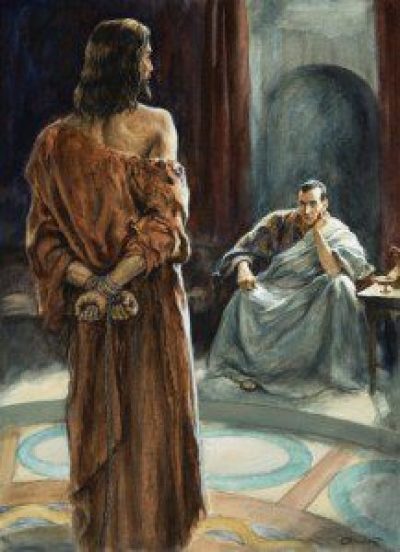
His mouth said it all. His lips were pursed, tight; his face was closed. As the former leader of the so-called free world, he was not used to being in a courtroom, facing charges. The door wasn’t held open for him when he entered – there was no band striking up, ‘Hail the chief!’
Not long after his courtroom appearance, back in his comfort zone in Florida, Donald Trump spoke to cheering supporters, rambling on and repeating the lies that it appears he has come to believe himself.
Recognising truth
Two thousand years ago, the Roman leader of Israel, asked the question when interviewing Jesus, “What is truth?” During his ministry, Jesus had declared that he was “the truth…” Although Pontius Pilate had asked that questionwhen he was faced with Jesus, he later said of Jesus that “he could find no fault with him.” Pilate had recognised the truth.
Even though he bowed to the will of the mob, and allowed Jesus to be taken away to be crucified, Pilate was not prepared to change what he had ordered to be written on the sign installed above Jesus on this cross - “The King of the Jews.” When challenged to write instead, “He said, he was the King of the Jews,” Pilate’s response was adamant – “What I have written, I have written.”
Pilate had faced – and recognised the Truth.
Good Friday challenges us to face the truth – about Jesus, and about ourselves. Sometimes it is only when we allow the searchlight of the Spirit of God to probe our beings, that we are able to face the truth about who we are. It is in facing and accepting Jesus as the Truth, that we are enabled to see who we are.
Accepting – but not living out the truth
Sometimes like Pilate, we see who Jesus really is – and we can accept it – but we don’t let it alter our lives. Pilate was too concerned about his position as leader and his reputation, to be prepared to let Jesus go. He was wanting to avoid a confrontation – after all, it would not go down well with Rome, if there was rebellion and unrest in the part of the empire that Pilate was responsible for. If allowing Jesus to be crucified was going to satisfy the crowd, then even though Pilate knew Jesus was innocent of the trumped-up charges, having one man die would hopefully ease the situation.
Sometimes expediency gets in the way of the Truth.
Who do we trust?
Many people can’t face the truth about Trump. They have followed him – and they don’t want to be proved to be wrong. They have believed his rhetoric, swallowed his lies, and believed the conspiracy theories rife on the internet. They can’t accept they might have put their trust in the wrong person.
Similarly, many people have been unable to face the truth about Jesus, as to who he is, and what he does. Like the crowds in Jesus’ day, people today still mock, others turn awaydespite having recognised the truth, some doubt. Some see him only as the victim of the political situation of the time. During that first Easter, some of his closest followerswere disappointed that he didn’t overthrow the Roman tyrants.
It can be very difficult for people to face the truth about the leaders they put their trust in – it was true too for many German citizens who had believed what Hitler and the Third Reich had promised. Some never did face up to the truth about Hitler. And 80 years on, there are still Holocaust-deniers, despite the overwhelming evidence to the contrary.
Facing - and living out the Truth
On Good Friday, it looked as if the disciples had put their trust in the wrong person. Jesus was taken away, and crucified. It was all over. Although he had said he was “the way, the truth and the life”, and lived an extraordinary three years with them, teaching, healing and delivering people, his death had ended it all. The disciples were going to have to face that truth.
Of course, we know the story doesn’t end there. The disciples lived the rest of their lives, in the light of the Resurrection, following in Jesus’s footsteps, once the Holy Spirit had empowered them.
Similarly, we don’t have to be like Pilate, accepting the truth but then not letting it change us.
It is only in the light of the Resurrection that we can see the truth about what happened on Good Friday. Who Jesus is, and how he is the Truth, has to be looked at through the lens of both Good Friday and Easter Day. Because of these events, Jesus shows us the truth about ourselves – and he can empower us in the way we can live – if we allow Him.

Liz Hay is appalled by the amount of vitriol that is now being slung at any Christian who dares to comment on an issue raised in the media. Christianity is not only seen as an aberration, but is being increasingly regarded by some as a scourge to be removed from society. With the growing malevolence being expressed towards the church, it is no wonder that even going on to church property can be a daunting experience.
The balm of the natural world, and friendship with genuine and real people, that Liz experiences in her small village in the mountains is a wonderful antidote to anti-Christian comments.